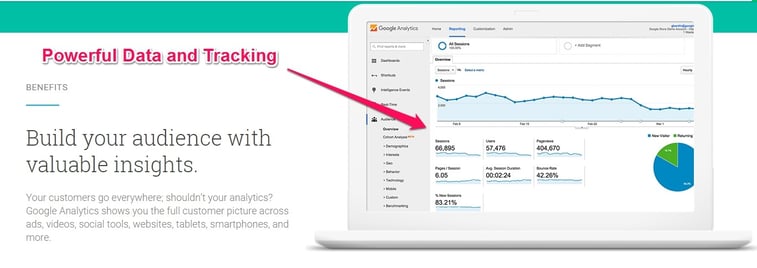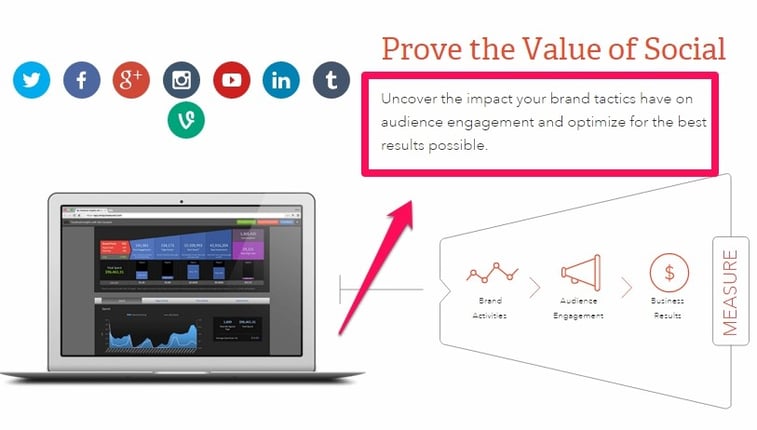When you begin a content marketing campaign, the first question your boss will ask you (or maybe you’ll ask yourself) is always the same:
What is the ROI (Return on Investment) here?
In order to answer that question, you need to properly track and show how specific areas, known as KPI’s (Key Performance Indicators) are moving towards the goals you set.
When you begin a content marketing campaign, the first question your boss will ask you (or maybe you’ll ask yourself) is always the same:
What is the ROI (Return on Investment) here?
How much money, traffic, or conversions are we going to get from this investment? This questions comes up in any type of campaign from content marketing, to managing an SEO campaign. In order to answer that question, you need to properly track and show how specific areas, known as KPI’s (Key Performance Indicators) are moving towards the goals you set.
Today we’ll take a look at the typical preparations and tools that you should be using to properly track all the important aspects of your content marketing campaign.

How To Define Your Campaign’s Goals & KPI’s
The definition of insanity, as it is popularly categorized, is “doing the same thing over and over again and expecting different results.” Sometimes, content marketers do this and they don’t understand why their approach isn’t working.
Implementing a campaign is only half of the game. The other half comes from tracking and analyzing the results. That way you can see how to properly promote your blog and increase traffic. This tracking will give you the information you need to decide if things are working, or if they need to change.
Here are some essential tips and strategies for defining your campaign’s goals and KPI’s:
1. Define What Information To Track
While you could track everything there is to track, you won’t need all of it. Instead, consider your specific situation and what you would most benefit from tracking. Here are some questions to ask yourself:
- Do you have more than one author? Consider tracking who wrote each post.
- If you’re implementing multiple types of content like text and video, track each type to see what is and isn’t working.
- Multiple post categories? Track them by specific topics.
2. Define Your Key Metrics
The next step is to see which key metrics are going to give you the best insight into the items you’re tracking. Compare your metrics to your tracking items and your overall goals for best results. Let’s say one of your KPI’s is bounce rate. You should compare bounce rate numbers with the number of pages people are visiting and which ones are getting the most hits so you can replicate that success on other posts.
Most content marketing campaigns track:
- Traffic
- Brand Awareness
- Customer Engagement
- Conversion Rate.
The last one is especially important because it directly affects the bottom line - revenue.
3. Set Realistic Goals
Setting your goals begins with understanding what you want your content to do in overarching purpose. Here are some examples of common goals for your content:
- Increase your brand’s influence
- Bring more traffic to your website
- Create sales leads
- Convert leads into customers
- Increase retention.
Three Recommended Tools To Track Your Campaign
There are hundreds of tools out there that are all trying to convince you they’re the best. Trying to sift through all of them is an impossible task for someone who just needs to manage, streamline, and track their content marketing campaign in a way that is both efficient and accurate.
Here are three tools I recommend. These are a mixture of management tools, and tracking tools for content marketers to use on a daily basis:
1. Google Analytics

If you don’t track your various KPI’s, then you’ll come up empty handed when the boss asks how you’re campaign is doing. One of the best tools for tracking these kinds of things comes straight from the source: Google Analytics.
This tool has been around for over ten years now, but it’s still receiving new improvements and features. At its basic level, you can use this tool to track things like traffic, bounce rate, time on page, and other common KPI’s. On a deeper level, it offers a huge variety of more advanced tools that give you not only insight, but the ability to take action to improve your numbers.
2. Yesware

Email marketing continues to be one of the most beneficial and untapped methods of digital marketing. When you build a strong email list, you create an army of leads who are ready and willing to convert in many cases. Tracking this kind of bold statement hasn’t ever been easy, until Yesware came along.
This tool shows you what happens after you click the “send” button. You can track email open and reply rates, link clicks, attachment opens, and presentation page views. All of these things provide key indicators that you can use to track the success of your campaign.
3. Simply Measured

Looking at today’s social media statistics, it’s insane how powerful these platforms are as tools for reaching, attracting, and converting customers. While you probably know this already, you may not know how to track the success of your social media efforts. One of the best tools out there for this purpose is Simply Measured.
Using this tool, you can track the activity on all of your social media platforms. While it does have paid options, you can use it to create free reports for Instagram, Twitter, Facebook, Vine, and Google+.
This will allow you to monitor the success of your paid efforts, and the activity on your pages, in addition to the activities happening on competitor pages.
Final Thoughts
The ultimate success of a campaign is the ROI it ultimately achieves. Using these tools and strategies, you can properly track your ongoing efforts and make changes as needed. What tips would you offer for tracking content campaigns?

